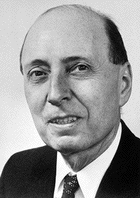Wigner, Eugene Paul
From The Encyclopedia of Earth
August 18, 2006, 4:06 pm
| Topics: |
Eugene Paul Wigner (1902-1995) was a Hungarian physicist who won the 1963 Nobel Laureate in Physics for his contributions to the theory of the atomic nucleus and the elementary particles, particularly through the discovery and application of fundamental symmetry principles. In addition to being a theoretical physicist of the first rank, he is considered one of the founders of nuclear engineering. He led the group that designed the first very high-powered nuclear reactors, which were built at Hanford, Washington during the Manhattan Project, for the production of the isotope plutonium-239.
Further Readings
Eugene Wigner – Biography (Nobel Foundation)
